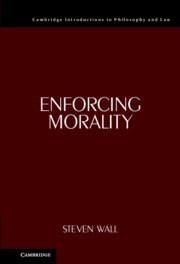Book contents
- Enforcing Morality
- Cambridge Introductions to Philosophy and Law
- Enforcing Morality
- Copyright page
- Contents
- Acknowledgments
- 1 Introduction
- Part I Background Controversies
- Part II Critical Legal Moralism
- 5 Ethical Environmentalism I
- 6 Ethical Environmentalism II
- 7 The Good of Personal Liberty
- 8 Rights to Do Wrongs
- 9 Free Expression
- 10 Pragmatism and the Perils of Enforcement
- Bibliography
- Index
9 - Free Expression
from Part II - Critical Legal Moralism
Published online by Cambridge University Press: 03 November 2023
- Enforcing Morality
- Cambridge Introductions to Philosophy and Law
- Enforcing Morality
- Copyright page
- Contents
- Acknowledgments
- 1 Introduction
- Part I Background Controversies
- Part II Critical Legal Moralism
- 5 Ethical Environmentalism I
- 6 Ethical Environmentalism II
- 7 The Good of Personal Liberty
- 8 Rights to Do Wrongs
- 9 Free Expression
- 10 Pragmatism and the Perils of Enforcement
- Bibliography
- Index
Summary
The right to free expression is of special importance for any discussion of the legal and social enforcement of morality. This is true for two main sets of reasons. First, the free expression and communication of ideas in a political society profoundly affects its ethical environment. The right to free expression, or more precisely the social condition that is brought about by the adequate recognition and protection of the right, is itself a public good. Second, the free expression and communication of ideas, especially ideas relevant to politics, is widely considered to be a condition of government legitimacy. Governments that wrongly deny their subjects the right to freely express their ideas forfeit a claim to rule over them. This chapter engages with both sets of reasons, which are referred to as the public good consideration and the legitimacy consideration, respectively, with an eye toward clarifying the grounds of the right to free expression and the limits to its scope. The chapter pays special attention to the issue of whether the right to free expression extends to so-called dangerous speech; that is, speech that advocates for violence against the government and/or certain targeted groups.
Keywords
- Type
- Chapter
- Information
- Enforcing Morality , pp. 168 - 198Publisher: Cambridge University PressPrint publication year: 2023

